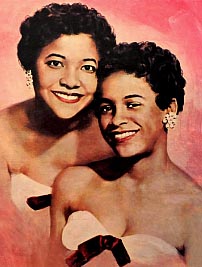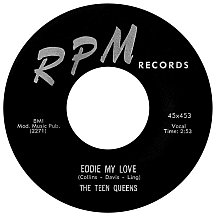THE TEEN QUEENS
Eddie My Love
Singer Aaron Collins had his share of good times in the often unforgiving music business. He moved from his home in the small town of Kress City, Arkansas, to Los Angeles, where he joined an R&B group that operated under two names, The Jacks and The Cadets, simultaneously recording for RPM and Modern, a pair of labels owned and operated by Saul Bihari and his brothers Jules, Joe and elder brother Lester. "Why Don't You Write Me?" was a hit for the Jacks in the fall of 1955, giving Collins his first hit record at the age of 25.
By that time his family had left Arkansas and settled in nearby Venice, California; his teenage sisters Betty Collins and Rosie (birth name Rose), fascinated by the apparent glamour of show business, pestered Aaron about using his connections to get them in the door at the record company. He wrote a song, "Johnny My Love," as a tribute of sorts to R&B star Johnny Ace, who'd accidentally killed himself the previous Christmas, though with many "Johnny" songs already in circulation he decided to change it to "Eddie My Love." The Biharis were game to give the girls a shot, but there was a catch: Saul Bihari (using the pseudonym Sam Ling) and the record's producer-arranger, Maxwell Davis (who played sax on the track), shared in the songwriting credits and potential royalties. The song was recorded, along with an uptempo B side, "Just Goofed," near the end of the year. Early pressings of the single, released in January 1956, credited a singular artist, the Teen Queen, but the oversight was quickly corrected to read The Teen Queens, neither variation suggesting a duo. The record hit the rhythm and blues charts in mid-February just as a new, similarly-named male act, The Teenagers, made the scene with "Why Do Fools Fall in Love."
In March the record crossed over to the pop charts, a first for any of the recently-emerging black "girl groups" (Shirley Gunter and the Queens and The Hearts, with R&B hits in '54 and '55, had been the only such acts to achieve any level of national success). A strong showing on the R&B charts put "Eddie My Love" in contention for number one, held back from the top spot by that Teenagers record (which made a rock star out of lead singer Frankie Lymon, at age 13 a year younger than Teen Queen Rosie). Older, more pop-oriented female artists began aggressively pushing their own versions of "Eddie My Love" and two of these, Dot's Fontane Sisters and Cadence's Chordettes, followed the original into the mainstream national lists. It was a fierce race; suddenly the Teen Queens were trailing both pop covers, which were getting more airplay, though the Queens' original outsold them both. All three wound up going top 20 in the spring of 1956, a "rock-paper-scissors" kind of battle that prevented any one from making it to the top ten.
Aaron found himself in a similar battle a few months later as his group, under the Cadets name this time, hit pay dirt with "Stranded in the Jungle," duking it out with The Jayhawks and pop group The Gadabouts, coming out on top once the dust had settled. The Teen Queens made an immediate impact with America's youth...and men! Rumors floated around that Earl "Speedoo" Carroll had a crush on Betty Collins, prompting the release of "Betty My Love" by his group The Cadillacs. Betty and Rosie, meanwhile, spent much of the year on tour promoting their hit and its follow-up, "All Alone," a way-too-similar record that failed to generate any interest among radio stations or concertgoers.

RPM released six singles by the duo. They displayed a fine knack for harmony singing in "Until the Day I Die" and "Love Sweet Love." Jerry Leiber and Mike Stoller stepped in to produce "I Miss You," an oddly appealing countryesque track with guitar backing, but it merely finalized their association with Modern/RPM as of late '57. RCA Victor signed the warbling siblings, resulting in two singles in 1958; "Movie Star" and "First Crush" are very good teen-style recordings, but the girls are nearly unrecognizable, coming across more like the pop princesses they had only recently battled for chart supremacy. Then there's Mack David's "You Good Boy - You Get Cookie," a curiously dominatrix-like tune for the "Guilty Pleasure" file: Betty and Rosie recite the title, alternating lines with a male group ('Me good boy? Me get cookie?') on what is essentially an instrumental band track.
Then an oddball single by The Humdingers (really Betty and Rosie) had a limited release on M.J.C.; "Hum Dinger" and its flip, "Wiggly Feeling," were written by older brother Aaron, who's believed to be a part owner in the short-lived label. In 1960, Buck Ram (the man behind The Platters' brilliance) showed an interest and signed the Teen Queens to his Antler label, starting them off with "There's Nothing on My Mind," a bluesy, no-nonsense answer to Bobby Marchan's bizarre singing-and-talking hit "There's Something on Your Mind" (a morbidly comic remake of Big Jay McNeely's more straightforward original from the previous year). Five singles for Ram's label went nowhere, including a bad-idea remake of their own "Eddie My Love." After a year or so there was one final Teen Queens record. Aaron, who'd scored with "Foot Stomping" on Felsted as a member of The Flares, helped out again, getting them a one-single deal with the Press label, home to the Flares in 1962. "Doodle Doo Doo" was credited to Betty and Rose (Formerly the Teen Queens).
In the end, Aaron Collins had reservations about getting his sisters involved in the business of making music. The lyrics of their classic song ('Eddie my love...I'm sinkin' fast...the very next day might be my last...') can be interpreted as tragically prophetic. Having such sudden success, at the ages of 16 and 14, unprepared for the adult situations that came with their brief burst of fame, the sibling Teen Queens found themselves exposed to many situations involving alcohol and drugs. Shifting into "party mode" during the grueling tour schedules ("They really went wild," Aaron once said), the girls developed hard-to-break habits that extended into adulthood. Rosie Collins suffered a fatal overdose in 1968; older sister Betty Collins similarly died in 1971. Though one of the more noted examples of a "one-hit wonder," they won't be forgotten. Those pop cover versions by The Fontane Sisters and The Chordettes may have stolen a lot of the glory back in 1956, but it's The Teen Queens' original recording of "Eddie My Love" that has stood the test of time.


